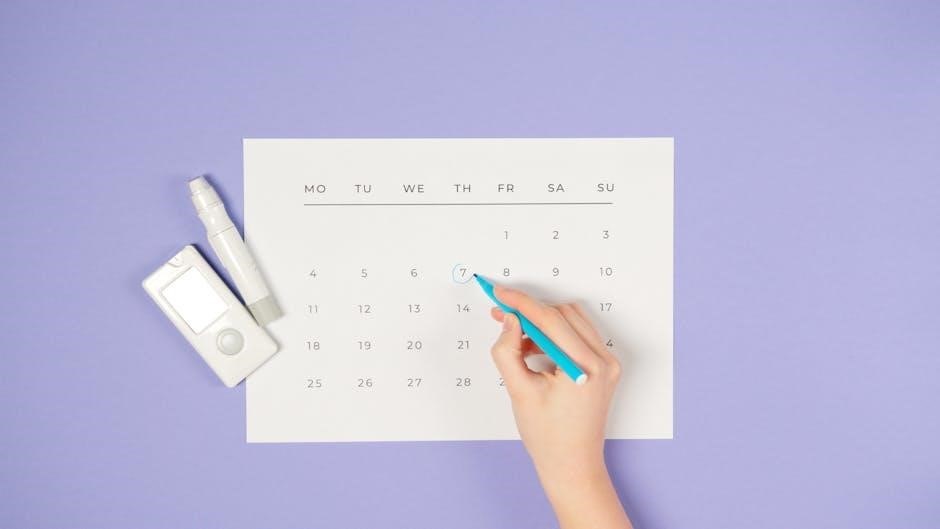A daily mental health check-in PDF is a powerful tool for self-awareness and emotional well-being. It helps individuals reflect on their feelings, thoughts, and experiences, fostering mindfulness and personal growth while providing a structured way to track mental health daily.
What is a Daily Mental Health Check-In?
A daily mental health check-in is a structured process designed to help individuals assess and reflect on their emotional state, thoughts, and experiences. It typically involves answering prompts or completing exercises to evaluate mood, identify triggers, and document feelings. This practice can be done using a downloadable PDF template, which provides a guided format for consistency. The check-in often includes sections for rating emotional well-being, noting gratitude, and recording positive or challenging events. It serves as a tool for self-awareness, allowing individuals to track mental health trends and gain insights into their emotional patterns. By incorporating this practice into daily routines, individuals can better understand their mental state and take proactive steps toward maintaining emotional balance and well-being.
Why is Mental Health Check-In Important?
A daily mental health check-in is essential for fostering self-awareness and emotional well-being. By regularly assessing your mental state, you can identify patterns, triggers, and emotional shifts, enabling better understanding of your feelings and behaviors. This practice helps in recognizing early signs of stress or imbalance, allowing for timely interventions. It also promotes emotional regulation by encouraging reflection on experiences and thoughts, which can enhance resilience and coping skills. Additionally, a mental health check-in cultivates gratitude and positivity by focusing on the good aspects of your day. This habit supports personal growth and helps individuals take proactive steps toward maintaining mental balance. Over time, it becomes a valuable tool for improving overall mental health and well-being, making it a crucial part of a daily self-care routine.

Benefits of Using a Daily Mental Health Check-In PDF
Using a daily mental health check-in PDF enhances emotional awareness, identifies patterns and triggers, supports emotional regulation, encourages gratitude, and promotes accountability for mental well-being.
Improves Emotional Awareness
A daily mental health check-in PDF enhances your ability to recognize and understand your emotions, thoughts, and physical sensations. By regularly reflecting on your emotional state, you can identify how you feel at different times of the day, helping you become more attuned to your inner experiences. This practice allows you to label emotions, such as happiness, stress, or anxiety, and explore their intensity. For example, rating your mood on a scale or visualizing emotions through color-coded charts can make emotional awareness more tangible; Over time, this process fosters a deeper connection with your emotional landscape, enabling you to respond to challenges more mindfully. Additionally, documenting your feelings helps you identify patterns and triggers, which is crucial for personal growth and mental well-being.

Helps Identify Patterns and Triggers
Using a daily mental health check-in PDF allows you to uncover recurring emotional patterns and triggers that might otherwise go unnoticed. By documenting your mood, emotions, and experiences over time, you can spot consistent trends, such as specific times of day or situations that regularly affect your mental state. For example, if you frequently feel anxious in the mornings or stressed after certain interactions, the check-in tool helps you identify these patterns. Recognizing triggers, like particular environments or behaviors, empowers you to address them proactively. This awareness is key to developing coping strategies and improving emotional resilience. Over time, the insights gained from your check-ins can guide meaningful changes, helping you navigate challenges more effectively and maintain better mental well-being.
Supports Emotional Regulation
A daily mental health check-in PDF is a valuable resource for managing and regulating emotions effectively. By consistently tracking your feelings and thoughts, you gain insight into how emotions ebb and flow throughout the day. This practice helps you recognize when certain emotions, such as stress or frustration, begin to escalate. Armed with this awareness, you can implement strategies to calm and stabilize your emotional state, whether through deep breathing, mindfulness exercises, or other coping mechanisms. Regular check-ins also encourage self-reflection, allowing you to process emotions in a healthy way rather than letting them build up. Over time, this consistent practice fosters emotional balance and resilience, making it easier to navigate life’s challenges with a clearer and more composed mindset.
Encourages Gratitude and Positivity
Incorporating a daily mental health check-in PDF into your routine can foster a mindset of gratitude and positivity. Many templates include a section for reflecting on things you are grateful for, helping to shift focus from stress or negativity to the positive aspects of your life. This practice has been shown to enhance emotional well-being by cultivating a sense of appreciation and contentment. By documenting positive experiences and achievements, you can reinforce their impact on your mood and outlook. Over time, this habit can lead to increased resilience and a more optimistic perspective on life. Gratitude practices, when done consistently, have been linked to reduced stress, improved relationships, and a greater overall sense of happiness. Making this a part of your daily routine can profoundly influence your mental health journey.

How to Create a Daily Mental Health Check-In PDF
Start by downloading a template, then customize sections to suit your needs. Include mood ratings, emotional reflections, and gratitude prompts for a comprehensive mental health tool.
Key Components of a Mental Health Check-In Template
A mental health check-in template typically includes sections for rating mood, documenting emotions, and identifying triggers. It may also feature a gratitude log and space for daily reflections. Some templates incorporate visual elements like mood trackers or emotion wheels to enhance understanding. Additionally, they often provide prompts for noting positive experiences and achievements, fostering a balanced perspective. Customizable fields allow users to tailor the template to their specific needs, ensuring it remains relevant and effective. Regular use of such templates helps individuals develop greater self-awareness and emotional resilience, making them invaluable tools for maintaining mental well-being.
Step-by-Step Guide to Downloading and Using the Template
To begin, locate a reliable source offering a daily mental health check-in PDF. Download the template by clicking the provided link or button. Once downloaded, open the file on your computer or mobile device. Start by filling in any required personal information, such as your name or the date, if prompted. Next, rate your overall mood using a scale or visual tool, as guided by the template. Take time to reflect on your emotions and document any triggers or challenging experiences. Many templates also include sections for gratitude and positivity, so jot down things you appreciate or positive moments from your day. Finally, review your entries and consider any patterns or areas for growth. Regularly using the template will help you stay consistent and proactive in managing your mental well-being.
Customizing the Template for Personal Needs
Customizing your daily mental health check-in PDF ensures it aligns with your unique needs and preferences; Start by reviewing the template and identifying sections that resonate with you, such as mood tracking, gratitude lists, or emotional triggers. If the template lacks specific areas you find important, consider adding custom sections, like a daily goal-setting area or a reflection space for positive experiences. Tailor the questions or prompts to address personal challenges or life circumstances, such as work stress or relationship dynamics. You can also adjust the format to suit your style, whether that means adding color-coded mood trackers or incorporating space for creative expression, like doodling or attaching photos. Regularly updating and refining your template keeps it relevant and engaging, ensuring it remains a valuable tool for your mental health journey.

Popular Templates for Daily Mental Health Check-In
Various templates are available to suit individual preferences, including basic check-ins, advanced trackers with visualizations, and specialized journals for students and adults, offering flexibility and personalization for mental health management.

Basic Mental Health Check-In Template
The basic mental health check-in template is a straightforward tool designed for daily use. It typically includes sections for rating your mood, documenting gratitude, and identifying triggers. This simplicity makes it accessible for everyone, allowing individuals to quickly assess their emotional state. Users can note their feelings, reflect on positive experiences, and track any negative emotions or triggers they encountered. Over time, this helps in recognizing patterns and emotional shifts. The template is often available in PDF format, making it easy to download and print. It’s ideal for those who prefer a minimalist approach to mental health tracking, focusing on essential elements without overwhelming details. By using this template, individuals can establish a consistent routine, promoting self-awareness and emotional well-being. Its simplicity ensures that even those new to mental health journaling can benefit without feeling overwhelmed.
Advanced Mental Health Tracker with Visualizations
An advanced mental health tracker with visualizations offers a comprehensive way to monitor emotional well-being. These templates often include charts, graphs, and other visual tools to help users track their mood, emotions, and progress over time. By incorporating visual elements, individuals can more easily identify patterns, triggers, and trends in their mental health. This tool is particularly useful for those who prefer a detailed and data-driven approach. The visualizations can highlight shifts in emotional states, helping users understand their mental health journey more deeply. Many advanced trackers also allow for customization, enabling users to focus on specific aspects of their well-being, such as stress levels, sleep quality, or productivity. This type of tracker is ideal for individuals seeking a more in-depth understanding of their mental health and how to improve it. It serves as a powerful resource for personal growth and self-awareness.
Mental Health Journal and Diary Templates
Mental health journal and diary templates provide a therapeutic space for individuals to express their thoughts and emotions. These templates are designed to encourage daily reflection, helping users process their experiences and gain insights into their mental well-being. Many templates include sections for documenting gratitude, identifying triggers, and tracking mood changes. They often feature prompts or guided questions to facilitate deeper self-reflection. Journaling has been shown to reduce stress and improve emotional clarity, making these templates a valuable tool for mental health management. Whether digital or printable, mental health journals offer a personal and intimate way to nurture self-awareness and emotional resilience. They are an excellent complement to other check-in methods, providing a holistic approach to mental health care and personal growth.
Specialized Templates for Students and Adults
Specialized templates for students and adults cater to the unique mental health needs of different life stages. Student-focused templates often include sections for academic stress, peer interactions, and goal setting, helping young individuals navigate school pressures while prioritizing their well-being. Adult-specific templates may address work-related stress, relationships, and long-term mental health goals. These designs are tailored to provide relevant prompts and exercises, ensuring the check-in process remains meaningful and targeted. Many templates offer customization options, allowing users to adapt them to their specific circumstances. By addressing the distinct challenges faced by students and adults, these templates promote consistent mental health practices and foster resilience. They serve as invaluable resources for individuals seeking to maintain emotional balance in their busy lives, offering structured yet flexible tools for daily reflection and growth.

How to Use the Daily Mental Health Check-In Effectively
Set a routine, be honest with your responses, and review your progress regularly. This consistent practice helps identify patterns, supports emotional growth, and fosters self-awareness over time.
Rating Your Mood and Emotional State

Rating your mood and emotional state on a daily basis is a cornerstone of effective mental health check-ins. Use a scale from 1 to 10, with 1 being extremely low and 10 being exceptionally high, to assess your overall mood. Additionally, identify specific emotions you experience throughout the day, such as happiness, anxiety, or frustration, and note their intensity. This practice helps you gain clarity on your emotional landscape and track changes over time. Consistency is key; set aside a specific time each day to reflect honestly on how you feel. By doing so, you can identify patterns, understand triggers, and develop strategies to manage your emotions more effectively. This simple yet powerful habit fosters self-awareness and supports long-term mental well-being.

Documenting Gratitude and Positive Experiences
Documenting gratitude and positive experiences is a transformative part of daily mental health check-ins. Taking a moment to reflect on what you’re thankful for shifts your focus to the good in your day, no matter how small. Write down specific events, people, or moments that brought you joy or comfort. For example, note a kind gesture from a friend or a beautiful sunset you enjoyed. This practice cultivates a positive mindset and helps counterbalance negative thoughts. Over time, it becomes easier to recognize and appreciate life’s small pleasures. Gratitude journaling also encourages self-reflection and mindfulness, fostering emotional resilience. By consistently documenting positive experiences, you create a valuable record of uplifting moments that can serve as a reminder of your strength and the beauty in your life during challenging times.
Identifying Negative Triggers and Emotions
Identifying negative triggers and emotions is a crucial part of maintaining mental health. A daily check-in PDF helps you recognize patterns in your emotions and pinpoint situations or thoughts that may be causing distress. By documenting these triggers, you can gain clarity on what affects your mental state and develop strategies to manage them. For example, note specific events, people, or environments that led to feelings of stress, anxiety, or sadness. This process encourages self-awareness and accountability, allowing you to address root causes rather than just symptoms. Over time, this practice can help you anticipate and prepare for challenging situations, fostering emotional resilience. By understanding your emotional responses, you can take proactive steps toward healing and personal growth, ultimately improving your overall well-being. This section is vital for developing coping mechanisms and enhancing emotional regulation skills.
Reflecting on Daily Achievements and Growth
Reflecting on daily achievements and growth is a vital part of maintaining a positive mindset and tracking progress in mental health. By documenting even small accomplishments, individuals can celebrate their successes and build confidence. This practice helps identify areas of improvement and fosters a sense of purpose. Many daily mental health check-in PDFs include sections for noting achievements, allowing users to visualize their growth over time. Reflecting on these milestones can enhance self-awareness and reinforce positive behaviors. It also encourages gratitude for the progress made, no matter how minor. This habit of acknowledgment strengthens resilience and motivates individuals to continue working toward their goals. By regularly reflecting on achievements, people can cultivate a more optimistic outlook and develop a greater appreciation for their personal journey. This practice is essential for nurturing mental well-being and sustaining long-term growth.
A daily mental health check-in PDF empowers individuals to prioritize their well-being, fostering self-awareness and emotional resilience. Regular use enhances mental health management and personal growth effectively.

Final Thoughts on the Importance of Mental Health Check-Ins
Daily mental health check-ins are a transformative practice for maintaining emotional balance and well-being. By dedicating a few minutes each day to reflect on feelings, triggers, and gratitude, individuals can gain profound insights into their mental state. This habit fosters self-awareness, helping to identify patterns and emotional shifts early, which is crucial for proactive mental health management. Regular check-ins also encourage emotional regulation, allowing individuals to respond to challenges more mindfully. Over time, this practice cultivates resilience, positivity, and a deeper understanding of oneself. Incorporating a mental health check-in PDF into your daily routine is a simple yet powerful step toward prioritizing your well-being and fostering lasting personal growth. Consistency is key, and the benefits of this practice can lead to a more fulfilling and emotionally balanced life.
Encouragement to Make It a Daily Habit
Making a daily mental health check-in a consistent habit can have a profound impact on overall well-being. By prioritizing this practice, individuals can foster greater self-awareness, emotional resilience, and mindfulness. Even a few minutes each day can lead to significant positive changes over time. Encourage yourself to embrace this routine as a commitment to your mental health journey. The process is simple, and the benefits are invaluable, from identifying patterns and triggers to cultivating gratitude and positivity. Consistency is key, and the more you practice, the more intuitive it becomes. Over time, this habit will empower you to navigate life’s challenges with greater ease and confidence; Remember, small, intentional steps today can lead to long-term emotional balance and a healthier, happier you.
